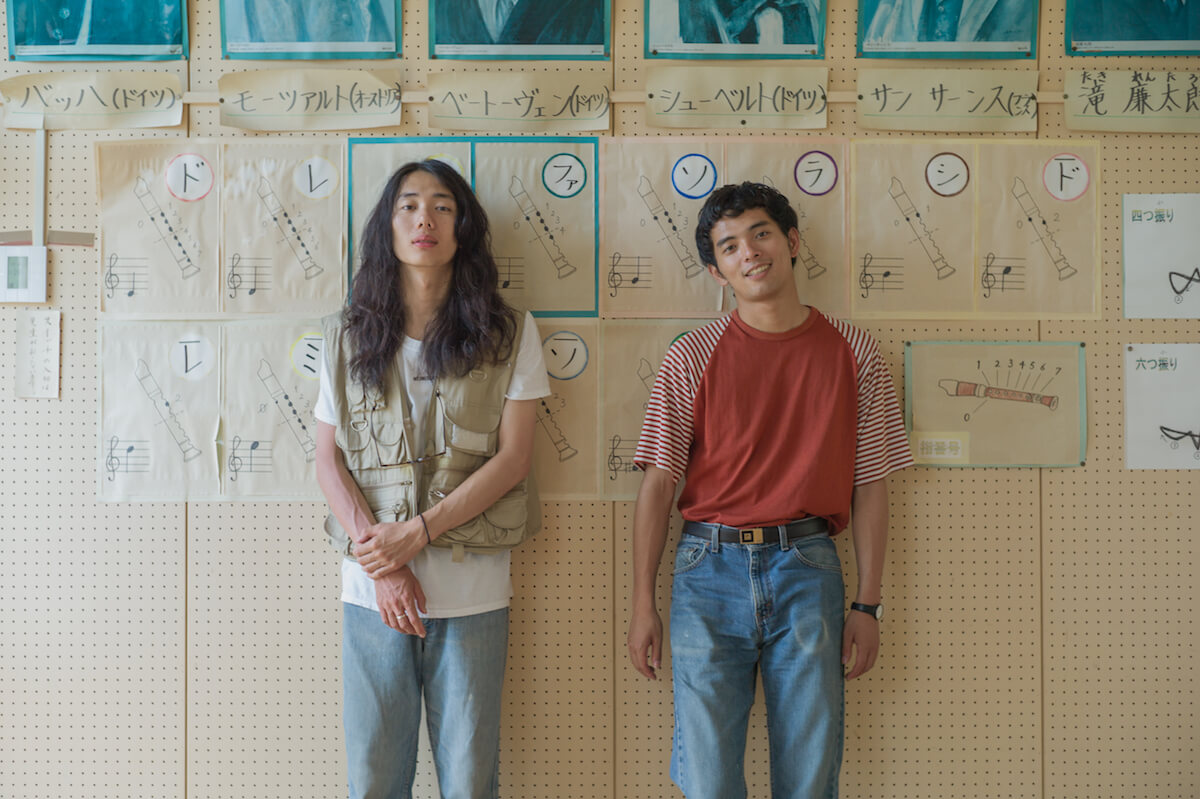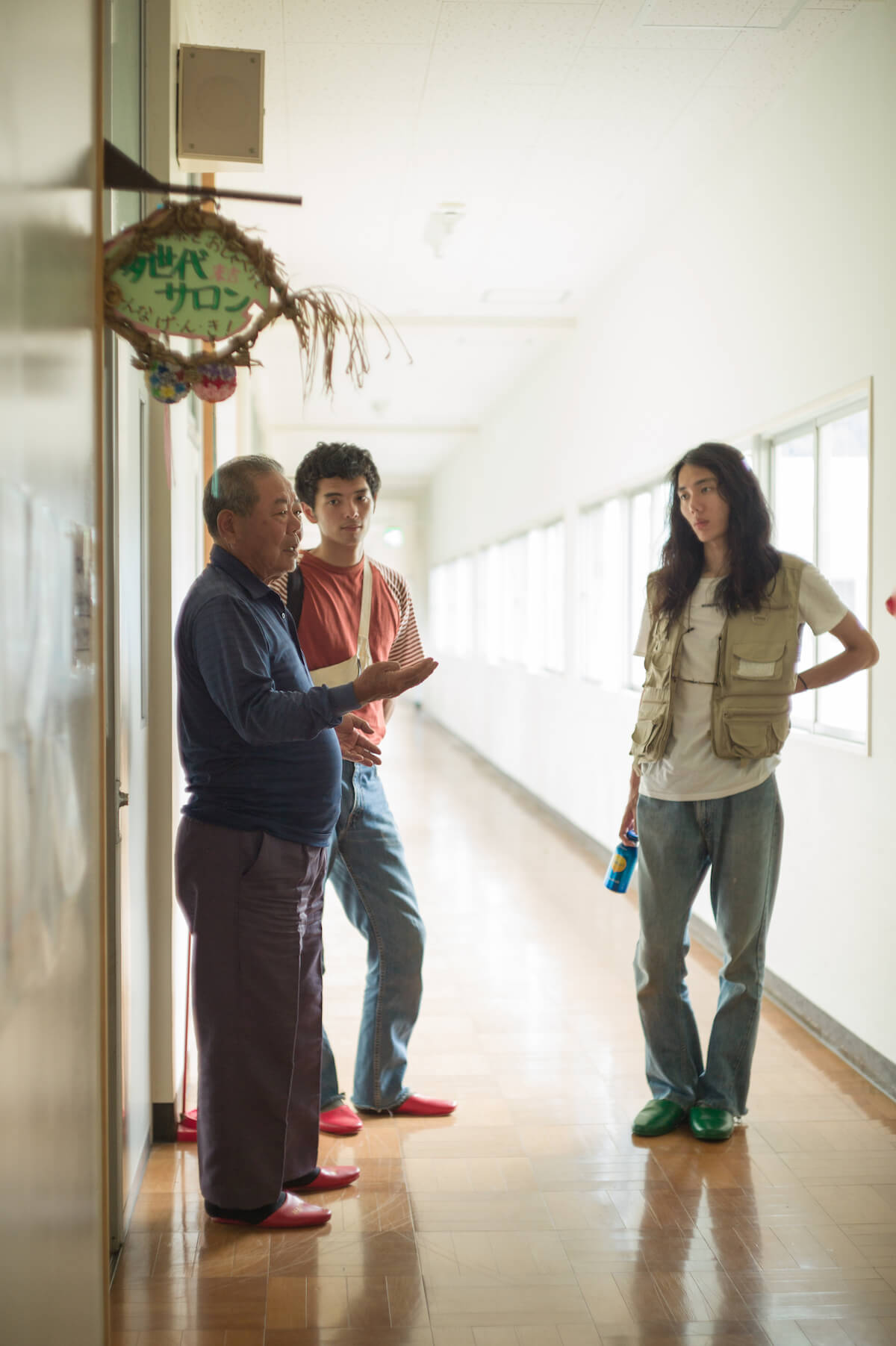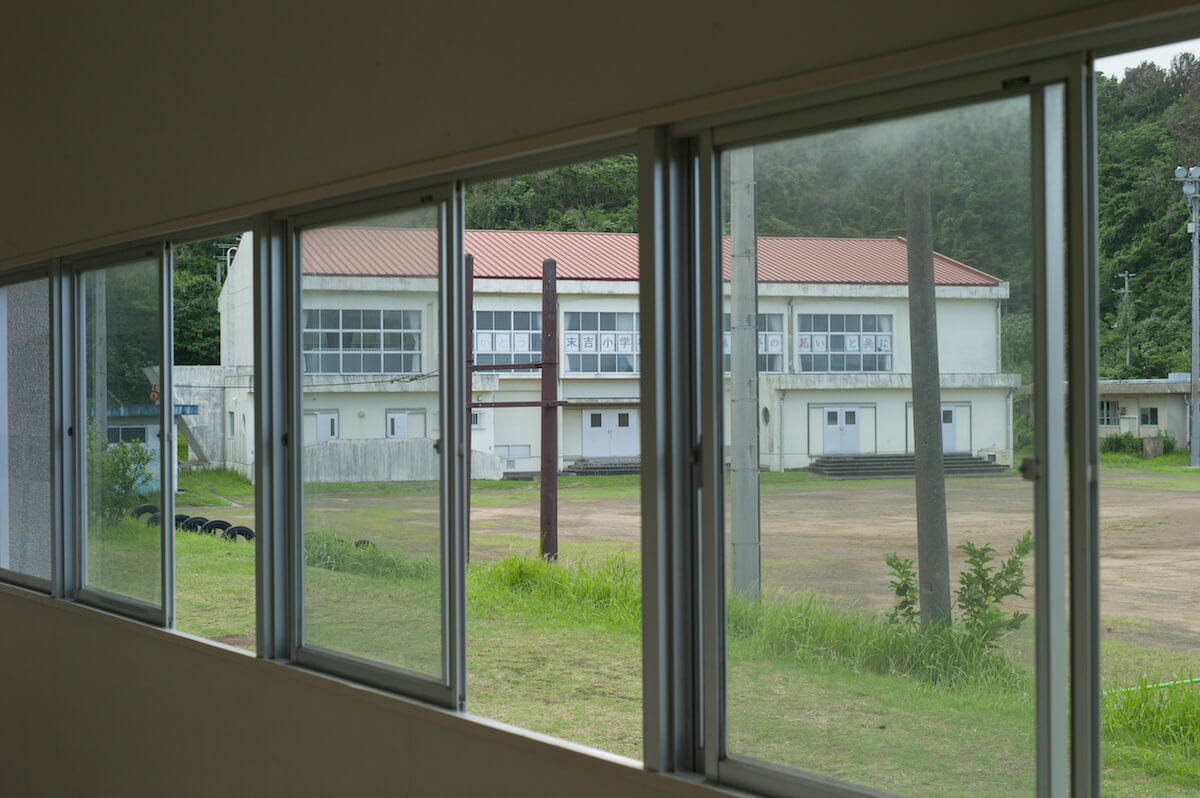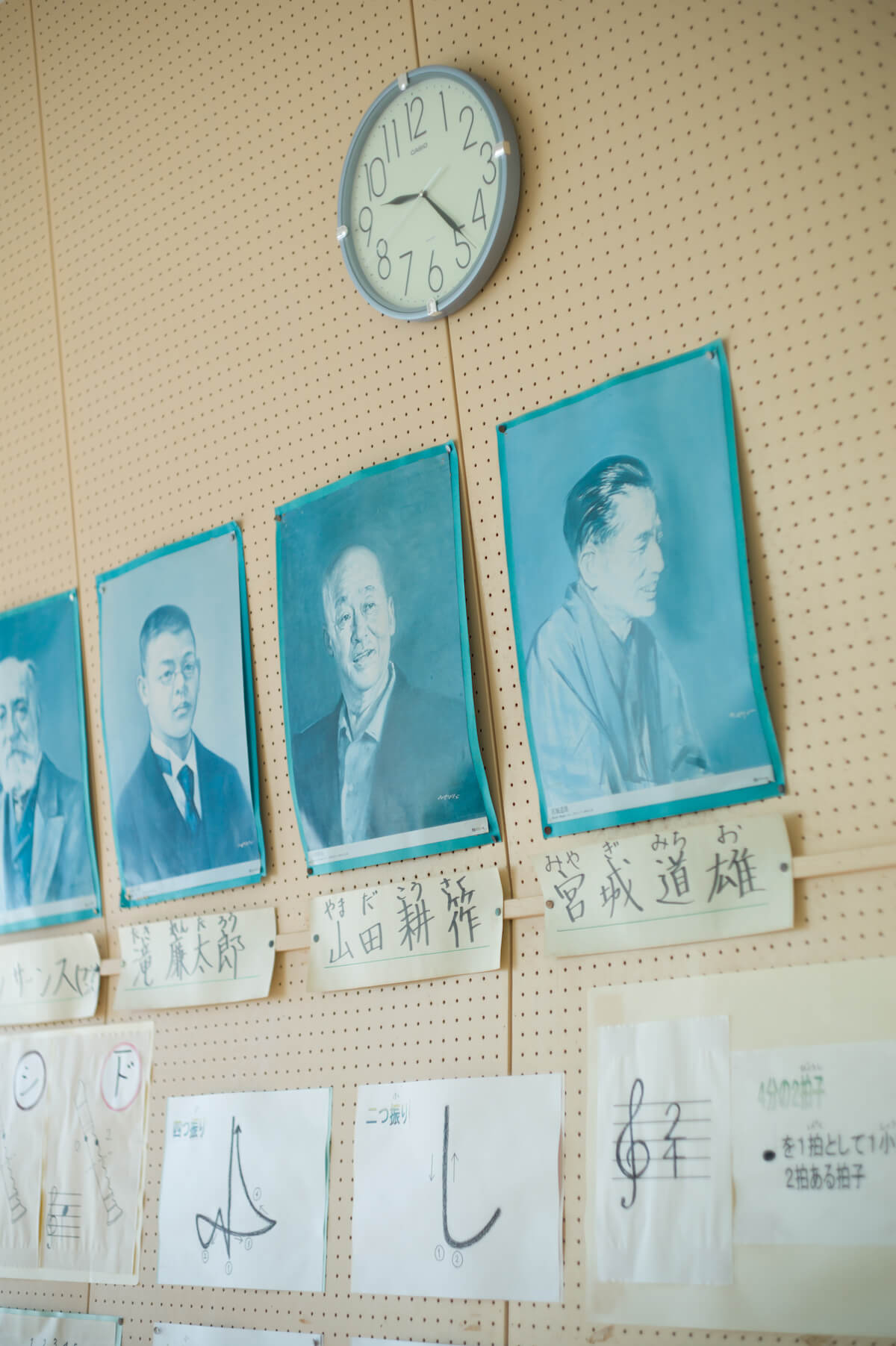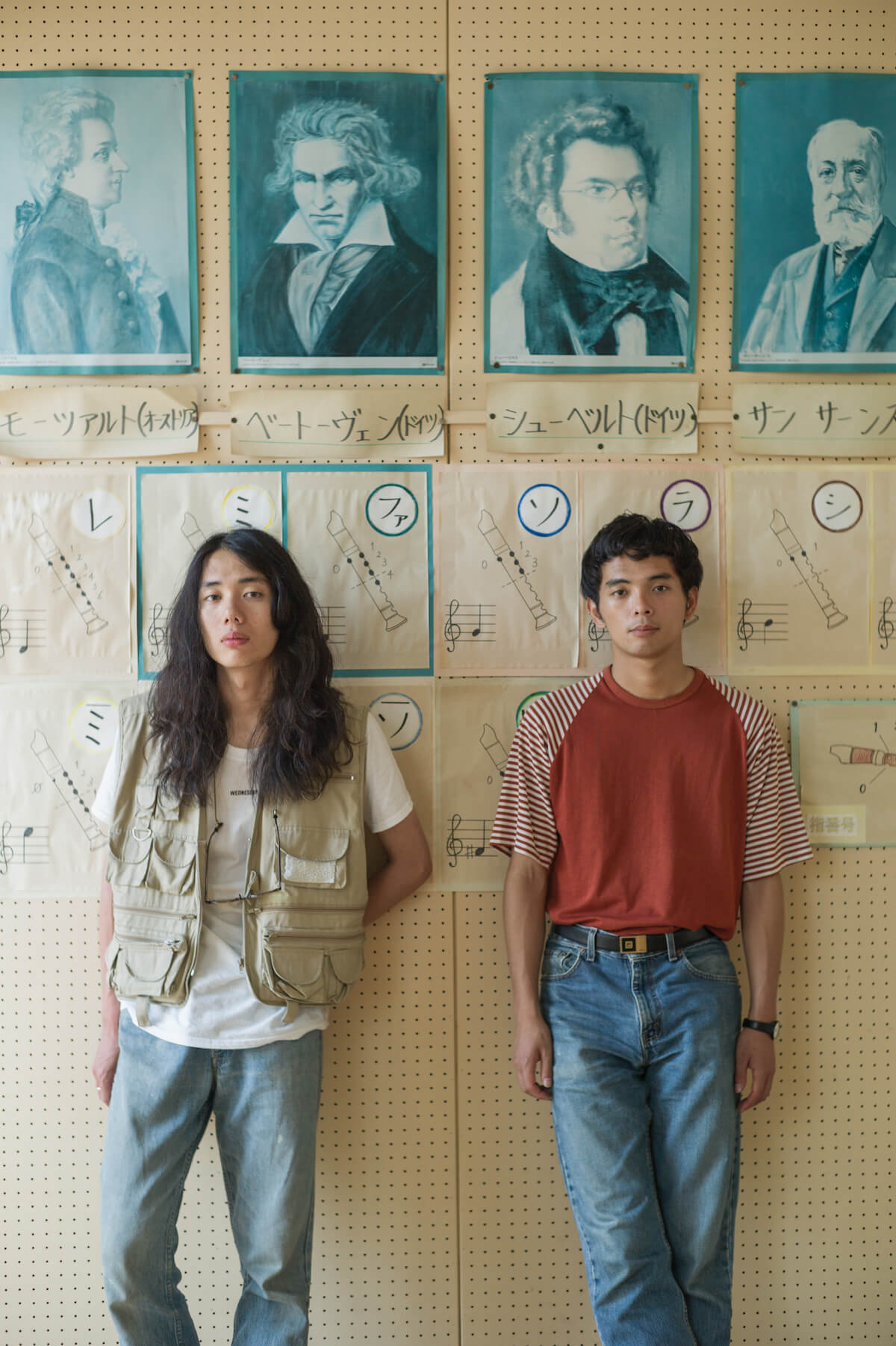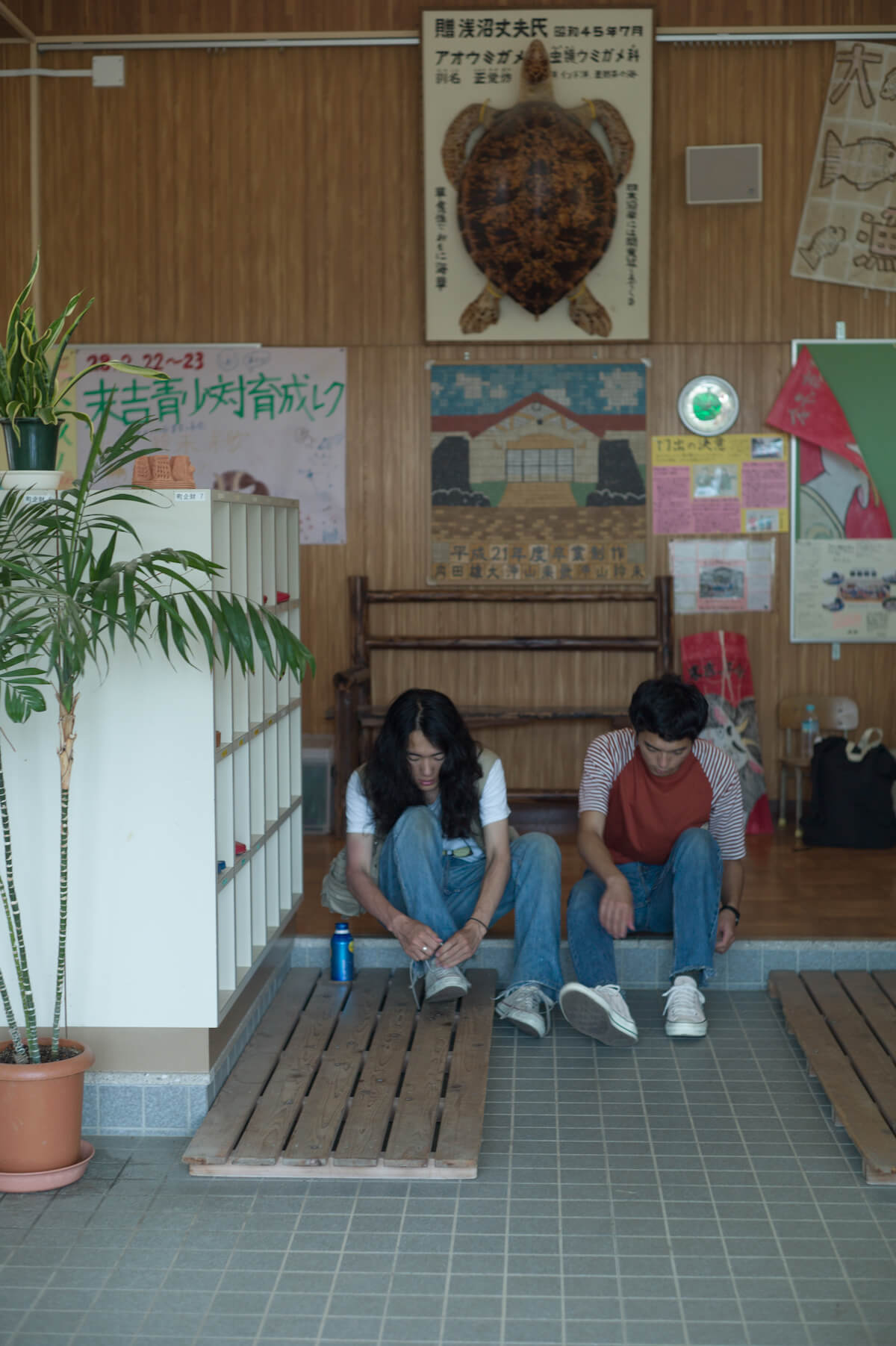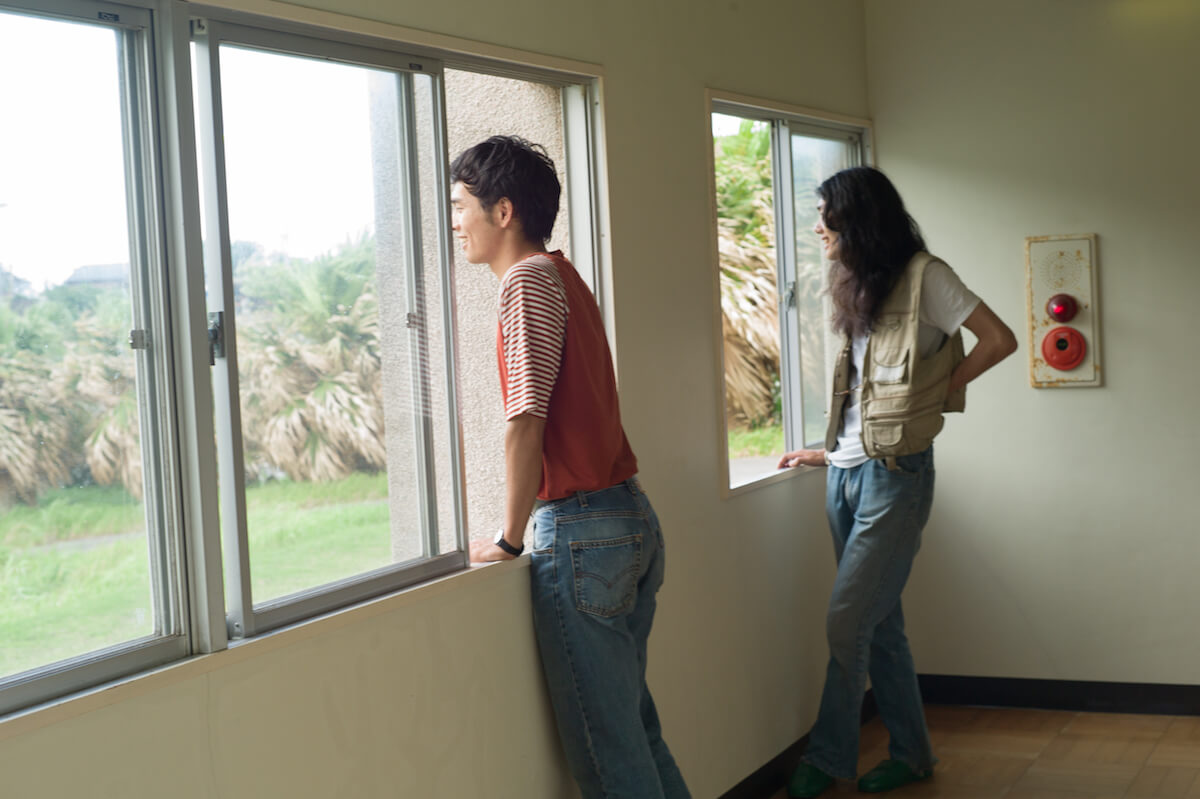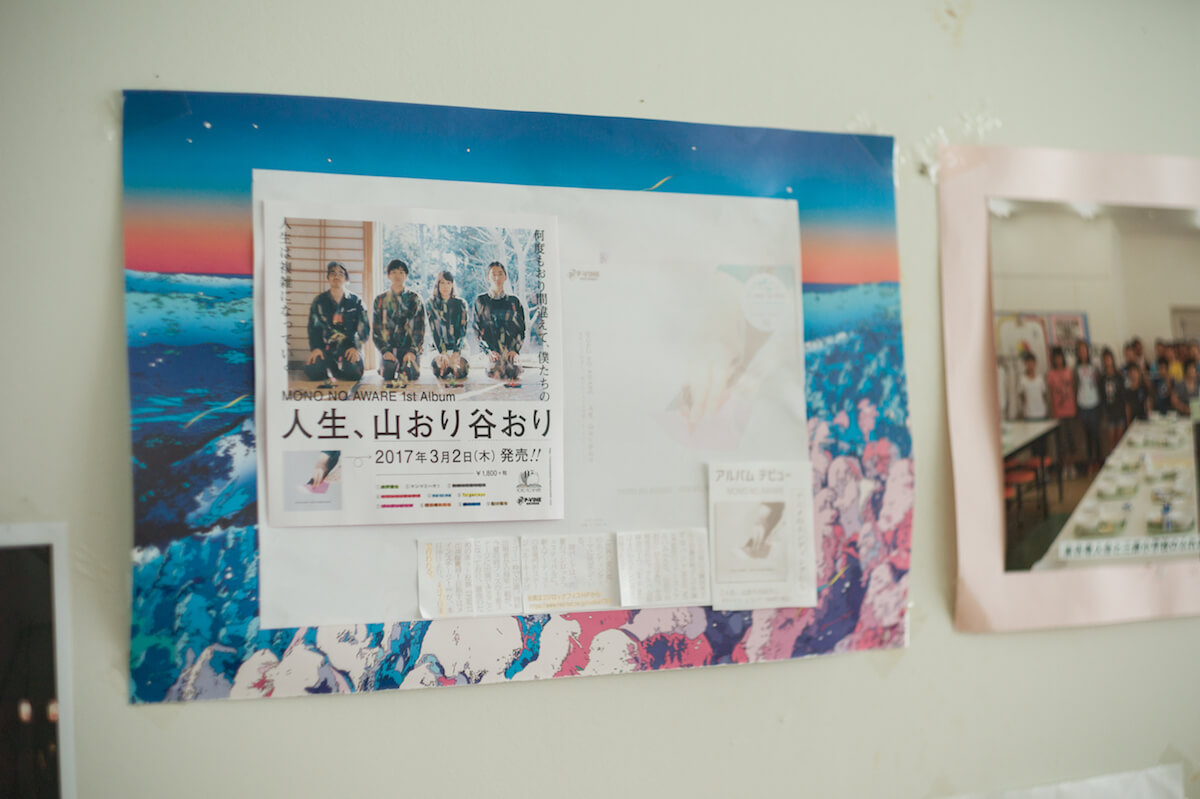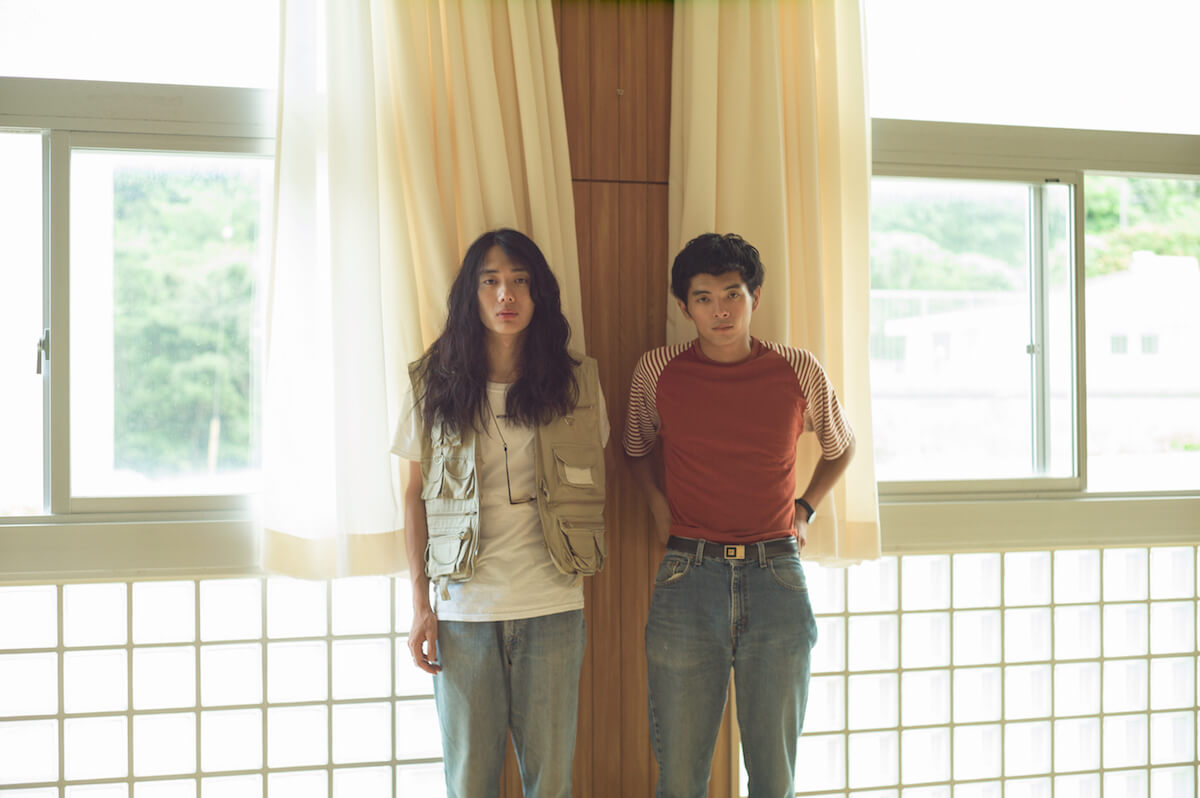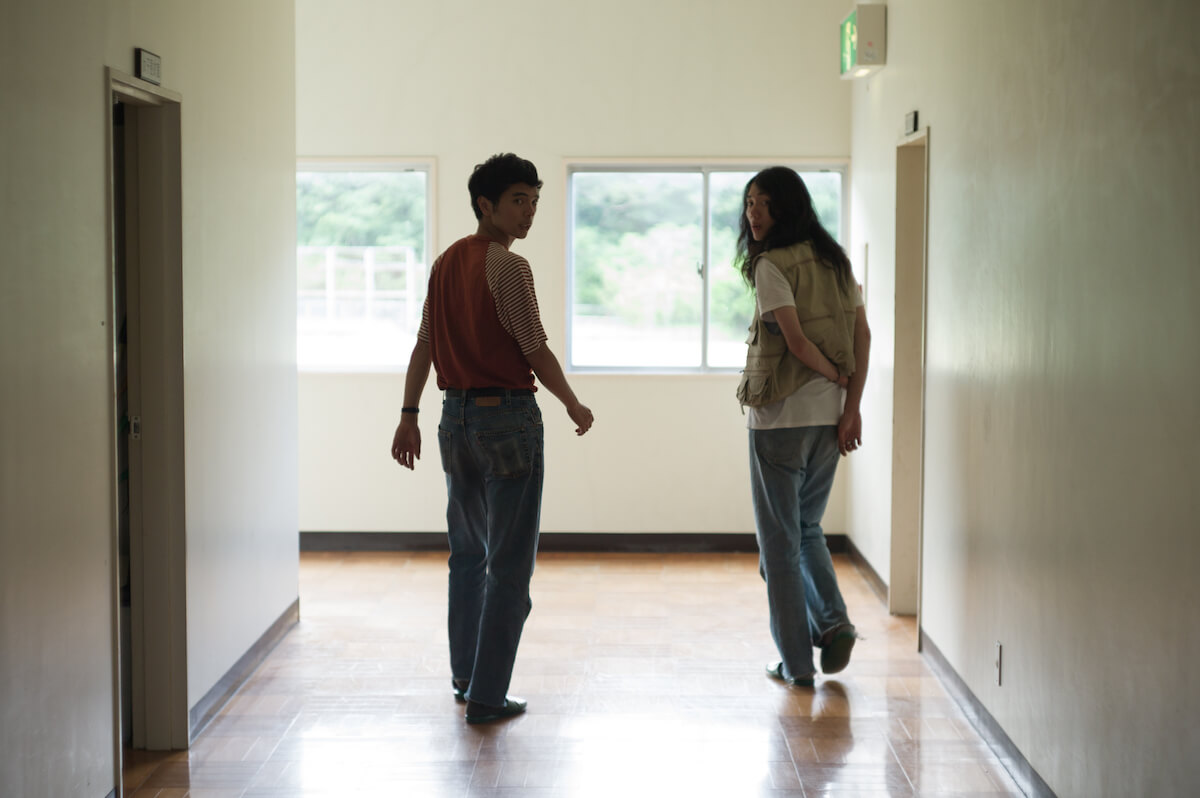Here is an interview with MONO NO AWARE members Tamaoki Shukei and Kato Seijun. The interview focuses on how the pair first met, as well as on the band’s sophomore album. Enjoy!
Interview & text: Miyake Shoichi (Japanese text)
English translation: Henkka
MONO NO AWARE links: Website, Instagram, Facebook, Twitter
Note: You can buy AHA on CDJapan.
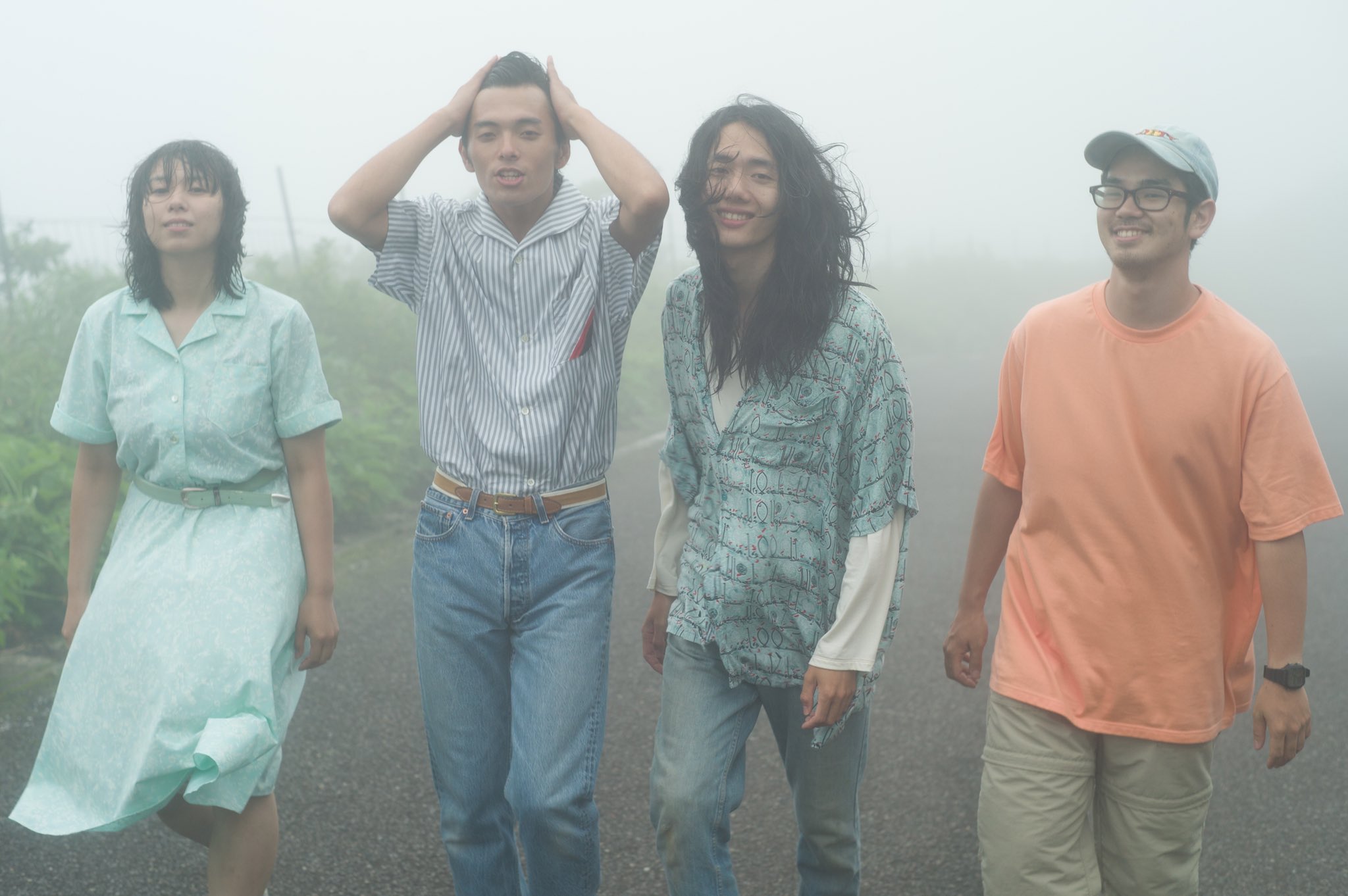
MONO NO AWARE
(L-R) Takeda Ayako, Tamaoki Shukei, Kato Seijun, Yanagisawa Yutaka
MONO NO AWARE have just completed their second album, AHA.
Ever since the band’s beginnings, there has been no one else like them when it comes to musical expression. “This part is rock, this part is pop“—there are no such borderlines in their music. And yet, their musical imagery carries with it a contemporaneity which organically reminds the listener of all kinds of different cultures, along with a synchronicity which makes it feel like you’re tripping between reality and some parallel world.
Those aspects of the band’s music become even more vivid on this work, with the evolution in their sound production and songwriting making one’s earliest childhood memories rise to the surface.
Having accompanied the band for the filming of their music video for this album’s lead song, “Tokyo,” we then conducted an interview with their songwriter/vocalist/guitarist Tamaoki Shukei and guitarist Kato Seijun.
We visited their hometown of Hachijojima, Tokyo—a 55-minute direct flight from Haneda Airport. While the town is actually still a part of Tokyo, that sense of travel I got from going down there and standing in that environment, surrounded by nature, it gave me flashbacks of that peculiar feeling one experiences when listening to MONO NO AWARE—a sense of, “It’s my first time here, and yet somehow it’s like I know this place.”
— When was it that you two first met here in Hachijojima?
Kato Seijun: Our first proper meeting, that would’ve been when we were in high school. But we already knew each other a little bit even in junior high.
Tamaoki Shukei: We met once at a track and field meet.
Kato: We didn’t exchange more than a word or two though.
Tamaoki: Seijun’s mother was my health ed teacher in elementary school. I knew Mrs. Kato had a son who was the same age as me, but I didn’t realize that was Seijun, and he just happened to be right next to me at the track and field meet. I did know her son was at the event, but I thought it was someone else.
Anyway, I remember us like throwing pebbles and messing with each other, neither of us even knowing the other one’s name. I still remember feeling glad when the long-distance race was about to start and Seijun wished me good luck. I ended up finishing before him though. (laughs)
Kato: Back then, Hachijojima had five elementary schools, three junior high schools, and then everyone would be all together in one high school. I had like 60 classmates in my high school class.
— While still a part of the Tokyo Metropolis, Hachijojima is actually one of the Izu Islands. What was your childhood impression of the main city of Tokyo?
Kato: It did feel like Tokyo was this city somewhere outside our island.
Tamaoki: It definitely didn’t feel like “Tokyo” was where we lived. Public holidays like the Tokyo Citizens’ Day didn’t make much sense to us—I was in first grade of junior high school when I first learned the kanji for “Tokyo Citizen.” I didn’t get why it was public holiday before then.
Kato: Oh! It only just now clicked for me! It’s a public holiday for residents of the Tokyo Metropolis. (laughs) That’s just how isolated life felt on the island. Going to Tokyo felt like travel. Like, this separate place where you went out to play.
Tamaoki: My first impression of Tokyo was really that of Disneyland. Whenever we did go traveling, it was pretty much always to Disneyland.
Kato: Same here!
Tamaoki: For me, the realization that Tokyo was actually the closest place mainland was when I left the island to enroll at university. I don’t think it would feel the same way when moving to Tokyo from somewhere like Saitama. Or like, someone who was born and raised in Amami moving to Kagoshima.
People who live in the city probably think of Hachijojima as like total back-country. Having been brought up surrounded by nature and then going to live smack middle in a metropolis for university, it definitely did feel like a huge disconnect.
Kato: And it feels pretty much mandatory, too. You graduate from high school, and then you leave for Tokyo on the mainland to go to university—that’s just how it goes. Sure, you can stay on the island, but there’s going to be no work for you. And not a lot of people move somewhere else on the countryside either. Everyone just goes to mainland Tokyo.
Tamaoki: For me as well, Tokyo was the only candidate I even considered as far as places to move to. It’s like even if you do end up somewhere else eventually, you at least go and live in Tokyo once before that. You’d maybe visit like Harajuku as a junior high schooler, but at that point it would still only feel like some parallel world.
— That’s something I also pick up on in the song “Tokyo,” the face of your new album. That is to say, this sense of “parallel worlds” and like this sort of a true-to-life “out-of-placeness.” Those are, I feel, keywords that are crucial to your band’s musicianship.
Do you think that your background—again, having been born and raised in Hachijojima—has maybe influenced MONO NO AWARE’s complex sound production which can cut between different genres even during the same song? Or like, the inexplicable pop quality of your songs?
Kato: There, it’s actually unrelated. I think it’s mostly just all thanks to Shukei’s personality—he’s always had the originality that allows him to write songs out of nothing. Maybe there’s a bit of that Hachijojima feel only in the sense that he’s thinking, “I’m going to create something by myself since it doesn’t already exist here.” I’m not sure though.
I always loved computers ever since elementary school. I could type without looking at the keyboard by third grade. (laughs) And then in junior high, I’d be online looking up news about Tokyo and about music and stuff. But Shukei was already making music on his own by the time we first met.
— You first started to compose using game software, right?
Tamaoki: Yeah, with Daigasso! Band Brothers. That was around the end of my first year of junior high.
— You probably wouldn’t have known about computer music software back then.
Tamaoki: Right, I’d never even heard of it. Going back even further, as a third grader or so I was given an old cellphone that my mother had stopped using, and I used it to make ringtones. That’s how it first started. You only had three tracks on the ringtone maker, but I’d do my best to make songs and use them as my alarm clock sounds. (laughs)
I thought Band Brothers was pretty similar, but there you had eight tracks and around 40 different tones, so that was fun. At first I was using it to make these songs that sounded like game music.
— To me, even just the fact that you would think to start making ringtones on your mother’s old cellphone seems pretty unusual!
Tamaoki: At the risk of trying to sound cool, I was starved for amusement. My parents did buy me games and stuff so I was definitely on the privileged side… but it doesn’t take long until you start getting bored of games. I felt like I wanted to play with something else, and just then my mother happened to give me that old cellphone of hers.
— But you didn’t start by listening to someone else’s songs and thinking, “I want to make music like this.” That is, you weren’t a listener first—you were a composer from the beginning.
Tamaoki: That’s true.
— Were you even aware that you liked music at that point?
Tamaoki: Mmm. Not really. It didn’t feel like music was my top form of entertainment. I enjoyed playing baseball and soccer—music was just another thing like that.
I was also taking piano lessons for a time, from third to sixth grade of elementary school. We had a piano at home. I was just playing around with it and my parents went, “Do you want to take piano lessons?” My little sister was already taking lessons before me and they just said, “Why don’t you take some, too?” It was such a pain, playing “Canon” and etudes and the like. (laughs)
— So the piano didn’t feel like entertainment to you.
Tamaoki: I think not, yeah. I’d go to the piano teacher’s house, and right away I’d be playing whatever I wanted, the piano teacher just watching in exasperation. Still, that teacher was someone who did accept me for who I was.
— When did you first pick up a guitar, Seijun?
Kato: My father would sing and play the guitar. He loved folk. Then, in sixth grade of elementary school I got him to buy me my own acoustic guitar—which he of course was very happy to do. (laughs) But I couldn’t play it very well, and I soon gave up on practicing.
I was hooked on table tennis from elementary school to around the second grade of junior high. At the same time, I also loved computers from around the the third grade of elementary school. Then, after I quit table tennis in my third year of junior high, I was invited to play in a band by this delinquent type friend of mine. He’d heard from somewhere that I could play a bit of acoustic guitar, and so he forced me to join his band, putting further pressure on me by introducing me to the others as a “crazy guitar god.” That’s when I really started practicing.
— Was it a cover band?
Kato: Yeah. We did covers of visual kei songs.
Tamaoki: Being forced to play visual kei even though you could hardly play at all… (laughs)
Kato: It was insanely difficult!
Tamaoki: Once we got to high school, there were suddenly all these friend groups who’d formed bands. At our school especially, there were so many people who wanted to play in a band—more than half of all the boys.
— Sounds like you had a bit of a local band boom going. (laughs)
Kato: Right! (laughs) It was really only our generation though.
— What kinds of music were you listening to, Shukei?
Tamaoki: I liked ORANGE RANGE and RADWIMPS, and then a friend introduced me to like Sum 41 and stuff. I was just listening to music that was popular back then.
My father is the type of person who gets hooked on certain music and then keeps listening to that same stuff forever. The attic at our house was like a vault, and it had this huge CD stereo system. You could put six CD’s in it, and he just kept playing those same six albums over and over again on repeat. It was Michael Jackson, Hamasaki Ayumi, Amuro Namie, Toto, and… Who else? But I just went crazy over Toto.
— Reacting specifically to Toto out of that lineup… How very you.
Tamaoki: I know, right? (laughs) Toto’s melodies were just so pleasant to me, and since the age of three until about the time I graduated from high school, whenever summer was beginning my father would always play music on that stereo system of his. So to me, it felt like whenever I heard Toto it meant summer was here. Still, even now it’s not like I’m very knowledgeable about music.
— It’s true that you don’t come across as the type who’d be always digging for new music. Seijun, though, does give the impression of someone who listens to all kinds of different genres.
Tamaoki: That’s right. I’m not into digging for different types of music.
— Rather than going digging for the songs you want to hear, it’s faster for you to just make them yourself. Is that how you think about it?
Tamaoki: I don’t feel this way so much anymore, but back in high school I definitely felt like rather than listening to other people’s songs, making them myself guaranteed that I was getting exactly what I wanted. That felt good. It’s not that I didn’t have any respect for other people’s songs, but it’s just… It was faster to write them myself, and it felt good.
— I’m sure you’d agree that a lot of MONO NO AWARE’s material has atypical song progressions. Is this perhaps the result of you having discovered exactly what feels good to you about music?
Tamaoki: Yes. That’s how it feels like to me. I’m always making new music by just like humming to myself.
— Straight away you must’ve thought Shukei to be a pretty interesting fellow, right, Seijun?
Kato: For sure. I used to always tell him that, and even the reason I wanted to start a band with him was because I wanted to spread the word and tell the world just how interesting this guy is. That’s still the case even now. That’s the biggest thing for me.
But it’s not just the music thing that’s interesting about him. On the day of our high school entrance exams, the Tokyo metropolitan area was struck by heavy snow. It wasn’t snowing over here though. Anyway, the entrance exams were set to start at the same time throughout all high schools. But then they pushed back the start time by two hours because of the heavy snow in central Tokyo, and so we on the island were just waiting around, being bored.
So then Shukei suddenly starts drawing all these different girls’ hairstyles on this piece of paper, and he goes around asking people he’d just met for the first time, “Hey, which hairstyle do you like the best?” (laughs)
Tamaoki: Even all the bad boys were answering in earnest. (laughs) Short hair came in first place, by the way.
Kato: He’ll make anything. He can draw, too, so at our school festival he made like a diorama of the Pokemon map. Stuff like that. The way he thinks is very interesting.
— Did the people around you find him unusual, too?
Kato: Surprisingly, not really. He also has that gentle side to him, making for a good balance. Recently, I actually find myself thinking how that, too, can really be heard in our songs. Some parts can be like totally out there, but in his mind Shukei’s able to make sense of them. Then, when he shares his music with the rest of the band, we’re able to flesh it out and make some really strong songs. If it was only like this really pointed kind of music, it wouldn’t turn into songs like this.
Tamaoki: I’m also not enough of a perfectionist to be able to make something “pointed,” as you put it. I’m never that fixated. As soon as a song begins nearing completion, I start getting bored. So for me, the most fun part of the process is making the demo—the actual recording can feel like a bit of a drag. That must be because I’m still partly just a kid, but that’s where the rest of the band covers for me, both on a musical and on a personal level.
Seijun is the one who in various ways judges us as a band. He’ll notice things that I’d never even thought of, and a lot of it is stuff that makes me go, “You’re right, doing it that way does make the band shine.” Sometimes I think he understands me better than I do. That includes knowing the means to make the best use of the songs I write. He considers the arrangements very carefully. I really do think he’s amazing. That to me is Seijun’s talent.
— You both complement one another with the parts the other one lacks.
Tamaoki: I think so, yes.
— Next, I’d like to ask you about the album. Firstly, what led you to writing the lead song, “Tokyo,” at this specific moment in time?
Kato: Shukei had initially written a song called “Tokyo” at his university music club. Although this new “Tokyo” ended up becoming quite different from that one, it was still a prototype of sorts. The chorus is still pretty much as it was then though. I always loved the song ever since back then.
Tamaoki: The lyrics were totally different. This was back during the re-emergence of city pop, and the people in our club were hyped up about it, too. While I didn’t want us to do city pop-esque tunes with MONO NO AWARE, I thought I’d try just for fun to see if I could write a song like that. The original lyrics were more along the lines of, “Me living in the big city.”
— So kind of like something very urban.
Tamaoki: Yeah. The sound was like that, too. But then, although I can’t recall now exactly what caused it, the song began to change more and more. Ultimately everything about it apart from the chorus changed—the melody, the lyrics, the arrangement.
— Why did you think to record this transformed “Tokyo” for your new album?
Tamaoki: It was initially Seijun’s idea.
Kato: A part of it was that we just didn’t have that many new songs left after releasing our previous album. But even that aside, I’d always felt like MONO NO AWARE could pull off “Tokyo.” That’s how much I liked the song. So I just said, “Let’s give it a shot.”
Tamaoki: And I said, “I’ll try and refine it some more then.”
Kato: I think it’s “Tokyo” that led to the creation of the other songs on the album that remind us of the island.
— So “Tokyo” was like the focal point evoking memories of your childhood.
Kato: Songs with, like… Our message.
Tamaoki: “Tokyo” was the first song on this album for which we made a demo. Then, making demos for the other nine songs it’s like visions of the island just started spontaneously appearing in my mind.
— Nature on the island, scenes from your school commute…
Tamaoki: I was surprised by how many sights from the island were suddenly emerging in my mind. It was strange. I expected to write more songs of a different type—tunes that were catchier than “Tokyo.” More, like… Super dance numbers like “Iwan Koccha nai.” Well, setting aside whether or not that song’s a “super dance number“… (laughs)
For me, “Tokyo” isn’t so much a danceable tune as it is—lyrics included—a bit of a heavy number. So I imagined that the album would consist of some more lighter numbers alongside “Tokyo,” when actually it turned out to be pretty much all heavy. Not so much in the sound, I mean, but the lyrics.
— It’s for that very reason that I think the early childhood imagery and this new musical form of MONO NO AWARE unfold simultaneously on this album.
To me, it feels like the center points of the album are “Tokyo” as well as the last song, “Sentimental Journey.” To me, the latter—and my interpretation could be totally off and I apologize if this is a misunderstanding—sounds like it is a song about a person following someone’s example and committing suicide.
Tamaoki: What made you think so? That’s amazing—that actually is pretty much what the song is about.
Someone I was close with on the island committed suicide the year before last. Some people might think it’s not my place to make an event like that into a song, but I was just so shocked by it… Anyway, after it’d happened, I was reading this travelogue, Sentimental Journey, by an English novelist called Sterne, and it said something like… “The reason people leave on a journey is either due to a physical or mental breakdown.” I was reading that and it made sense to me. To me, suicide overlaps with that line of thinking.
— It’s not that the song glorifies suicide, nor does it even focus on the act of suicide per se. I think the song is about something even deeper—about having someone who is truly important to you, and about how you can understand and assimilate that person’s feelings
Tamaoki: Yes. How do I put this…? There were many people at his memorial service, and I felt deeply touched seeing just how loved he was. But then the chief mourner said something along the lines of, “Although in the end he died a pitiful death…,” and those words just bothered me so much. I understood where they were coming from, but the question of whether or not death is truly something regrettable for the person who chooses it… Once I started thinking about that question, I couldn’t stop.
Since around the time one enters junior high school, you’ll start to hear some kids saying, “Anyone who kills themselves is a loser.” And I’d always thought, “Is that true though?” I liked to think about things like that. But somewhere along the line I stopped pondering those questions, until that person’s death brought all those feelings back.
Like… Maybe it’s not pitiful. Who knows, maybe to them it just felt like going on a bit of a journey. I know that might sound pretentious, but I really do feel that way. That’s what I was thinking about when I wrote the lyrics.
— “Shouganai yo, kimi wa mou mujuuryoku dakara” (“It’s no use, you’re already weightless”)—that phrase is tinged with a sense of resignation, and yet it just sounds so bright in the context of this song. That to me is a characteristic of your lyrics.
Tamaoki: Oh, that was just my play on the lyric “Iyo wa mada 16 dakara” (“Iyo is still only 16”). (laughs) (Note: Line from the Matsumoto Iyo song also titled “Sentimental Journey.”)
— Ah, so that’s how the song title comes into play! (laughs) I feel like you not forgetting your sense of humor was crucial when it came to singing this song.
Tamaoki: Definitely. I’m glad you think so. I think we’re part of a generation that grew up listening to and cultivating lots of these really intense bands. While I don’t look down on bands like that, I do feel like being all intense while trying to put some kind of a message out there is something that I just personally can’t do. I would just get embarrassed. That’s also why the lyrics on our last album were pretty much all jokes.
— But on this album you did have more depth.
Tamaoki: Yes. It just turned out that way naturally. I was aware of it though.
Kato: I think it’s good.
— That said, you also don’t wish to do away with the humor.
Tamaoki: Right. That’s why I always want to include some funny bits even in the songs that sound like they have a message.
— I just wanted to check with you on this one line from “Tokyo.” What was on your mind when you wrote: “Furusato wa kaeru basho de wa nain da yo” (“Your hometown is not a place to go back to”)?
Tamaoki: Back in university I read this book by Sakaguchi Ango… On Decadence, was it? In it, he writes something like, “It is not our job to go back to our hometowns.” That always stuck with me, and I’d think about it every now and then.
Sakaguchi Ango was not an idealist—if anything, he was the kind of person to say stuff like, “Tear down the Horyuji Temple and turn it into a parking lot.” Reading his work, I started to think about whether being immersed in nostalgia really had any intrinsic meaning to us as humans. I mean, not to say that I was an ardent student of his or anything, but reading his words—”It’s not our job to go back to our hometowns“—I felt like maybe that was along the lines of his thinking.
But then I felt that maybe that actually wasn’t what he’d truly thought in his heart—maybe he just felt like he had to say that, even if he was forcing himself to do so. I, too, had this moment in time when I felt like I just had to get back to the island. But then once I actually did get back, even when I went to the beach where a long time ago I used to play with my cousins and stuff, it all just felt so very small. The feelings I had felt there as a young child—they didn’t rise to the surface at all.
— You weren’t able to soak in the nostalgia.
Tamaoki: Right. That’s what I had wanted to do in going back there. But I couldn’t. So then I started to think: what if one’s hometown isn’t just a place? It’s not the place—it’s meeting and talking to the people you know there for the first time in ages that you start to finally feel like you’re home.
I also think it’s wrong to try and pull out memories from the past and force yourself to feel like it’s the “good old days.” Even if I’m exerting myself by doing so, I feel like right now I’m just at a point in life where I need to put it in those words. Who knows, when I’m 30 or so I might instead be saying, “Your hometown is absolutely a place to go back to.”
— When you have kids you might feel like you want to show them all those places from your own childhood.
Tamaoki: Right. But the fact that now when I go back to the island and it doesn’t move me, that only means that for me right now my hometown isn’t a place that makes me nostalgic. It’s not the island that’s changed—it’s me.
Kato: Conversely, when it rains like crazy in Tokyo and then it suddenly clears up and the air gets steaming hot again, that’s when you really start to miss home. But the thing is, even when you do go back to the island it’s not like there’s anything to do there but watch Netflix. (laughs)
Tamaoki: True. (laughs)
— Besides, you now have things to do in Tokyo.
Tamaoki: Yes. That’s something to be happy about. I think it’s in the moments you fail that you most feel the warmth of your hometown.
— It’s the one place that accepts you for who you are.
Tamaoki: I do think that’s what it’s all about. Your “hometown” is simply a concept that represents unconditional love.
